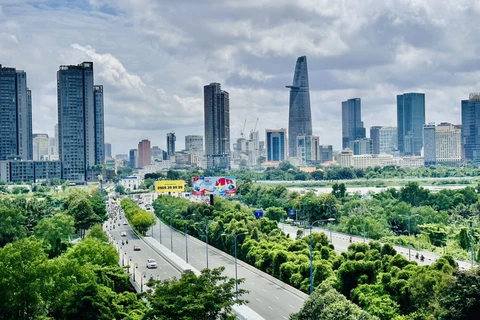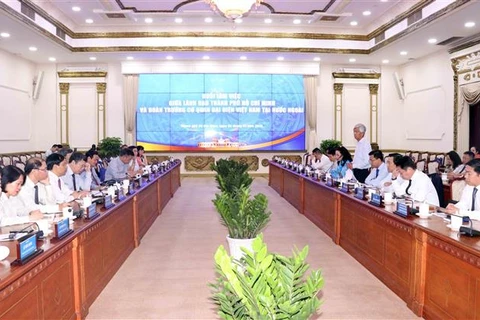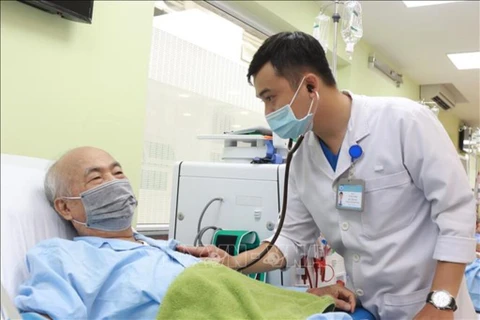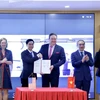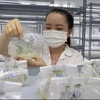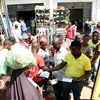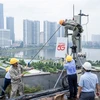HCM City (VNS/VNA) - Wholesale markets in Ho Chi Minh City will be gradually reformed to better serve both buyers and sellers and keep pace with socio-economic development trends, according to the municipal Department of Industry and Trade.
There are three major agricultural and food wholesale markets: Binh Dien in district 8, Thu Duc in Thu Duc city and Hoc Mon in Hoc Mon district.
They receive up to 8,000 tonnes of goods every night on average, including vegetables, fruits, meats, and seafood.
The wholesale markets play an important role in supplying especially essential items to the city, the department said.
But Nguyen Nguyen Phuong, deputy director of the department, said they are overloaded and have shortcomings, and have failed to keep up with socio-economic development.
Their infrastructure and technology use are limited, oversight and control of food hygiene and safety is difficult and impromptu selling in their vicinity is rampant and lack oversight, he said.
At the Binh Dien Wholesale Market, for instance, many illegal agricultural and food sellers sell on the street and sidewalk, and discard garbage around them, posing food safety and sanitation risks and significantly affecting small traders at the market, he said.
Switch to modern models needed
At a recent conference on the future development of wholesale markets in the city, experts emphasised the urgent need for investing in upgrading their facilities, standardising operating procedures and embracing digital transformation.
Wholesale markets face challenges due to the rise in online shopping and changing customer behaviours, and digital transformation could help them overcome challenges, they said.
Phuong said e-commerce is growing at 20-305a year, with HCM City being among the leaders in the list, and so, to adapt to the new situation, its wholesale markets could not ignore the trend of digital transformation of businesses.
HCM City seeks to build a new wholesale market model that meets five requirements: modern and ensuring hygiene and food safety and reliable supply, having systems to control the quality of inputs until they are transported to retail points, brand building and export orientation, an efficient management apparatus, and ensuring the management and operation of wholesale markets in line with the context of digital transformation, he said.
According to a research group from the University of Economics and Law (Vietnam National University, HCM City), the digital transformation of the three wholesale markets can be carried out in three stages: digital transformation of their business models and management models and incorporation of technologies to create new products and services.
Nguyen Thanh Hoa at the city’s Department of Information and Communications said relevant parties need to pay attention to the four basic pillars of digital transformation: human resources, new business processes, technology, and data.
If any of these four elements is missing, the digital transformation process would face many difficulties and have a low success rate, he added.
Phan Thanh Tan, Director of the Binh Dien Market Management and Trading Company, said there is great focus on digital transformation to better manage the wholesale market.
It has studied information technology models and learned from the successful digital transformation of wholesale markets in developed countries to select appropriate technologies and models, he said.
The company has also urged traders, partners and employees to limit the use of cash and adopt information technology for tracing pork origins (using identification rings), adding that it has also enhance the use of technologies in its management and access control system, he said.
Stepping up food inspections
At the three wholesale markets in HCM City, inspection of goods origins and environmental sanitation are regularly carried out, according to the city’s Department of Food Safety.
Its units and the markets’ management also regularly remind traders not to use chemicals and preservatives in fruits and vegetables, it said.
Its management team No. 10, stationed at the Binh Dien market, regularly checks the quality of goods and takes samples of all items that enter the market to test for borax, it added.
Nguyen Van Sac, head of the team, said: "We are inspecting all agricultural products to ensure they contain no banned substances. Particularly, We conduct more regular tests of some high-risk items. Only goods that have all indicators within allowable levels and clear documents are allowed to enter the market.”
According to the department’s management team No. 9 at the Hoc Mon Wholesale Market, nearly 500 samples of pork, vegetables and fruits were tested last year, and all met food safety standards.
Speaking about unregulated trading around wholesale markets, Pham Khanh Phong Lan, director of the department, said the city has established teams to focus on dealing with this “headache.”/.
There are three major agricultural and food wholesale markets: Binh Dien in district 8, Thu Duc in Thu Duc city and Hoc Mon in Hoc Mon district.
They receive up to 8,000 tonnes of goods every night on average, including vegetables, fruits, meats, and seafood.
The wholesale markets play an important role in supplying especially essential items to the city, the department said.
But Nguyen Nguyen Phuong, deputy director of the department, said they are overloaded and have shortcomings, and have failed to keep up with socio-economic development.
Their infrastructure and technology use are limited, oversight and control of food hygiene and safety is difficult and impromptu selling in their vicinity is rampant and lack oversight, he said.
At the Binh Dien Wholesale Market, for instance, many illegal agricultural and food sellers sell on the street and sidewalk, and discard garbage around them, posing food safety and sanitation risks and significantly affecting small traders at the market, he said.
Switch to modern models needed
At a recent conference on the future development of wholesale markets in the city, experts emphasised the urgent need for investing in upgrading their facilities, standardising operating procedures and embracing digital transformation.
Wholesale markets face challenges due to the rise in online shopping and changing customer behaviours, and digital transformation could help them overcome challenges, they said.
Phuong said e-commerce is growing at 20-305a year, with HCM City being among the leaders in the list, and so, to adapt to the new situation, its wholesale markets could not ignore the trend of digital transformation of businesses.
HCM City seeks to build a new wholesale market model that meets five requirements: modern and ensuring hygiene and food safety and reliable supply, having systems to control the quality of inputs until they are transported to retail points, brand building and export orientation, an efficient management apparatus, and ensuring the management and operation of wholesale markets in line with the context of digital transformation, he said.
According to a research group from the University of Economics and Law (Vietnam National University, HCM City), the digital transformation of the three wholesale markets can be carried out in three stages: digital transformation of their business models and management models and incorporation of technologies to create new products and services.
Nguyen Thanh Hoa at the city’s Department of Information and Communications said relevant parties need to pay attention to the four basic pillars of digital transformation: human resources, new business processes, technology, and data.
If any of these four elements is missing, the digital transformation process would face many difficulties and have a low success rate, he added.
Phan Thanh Tan, Director of the Binh Dien Market Management and Trading Company, said there is great focus on digital transformation to better manage the wholesale market.
It has studied information technology models and learned from the successful digital transformation of wholesale markets in developed countries to select appropriate technologies and models, he said.
The company has also urged traders, partners and employees to limit the use of cash and adopt information technology for tracing pork origins (using identification rings), adding that it has also enhance the use of technologies in its management and access control system, he said.
Stepping up food inspections
At the three wholesale markets in HCM City, inspection of goods origins and environmental sanitation are regularly carried out, according to the city’s Department of Food Safety.
Its units and the markets’ management also regularly remind traders not to use chemicals and preservatives in fruits and vegetables, it said.
Its management team No. 10, stationed at the Binh Dien market, regularly checks the quality of goods and takes samples of all items that enter the market to test for borax, it added.
Nguyen Van Sac, head of the team, said: "We are inspecting all agricultural products to ensure they contain no banned substances. Particularly, We conduct more regular tests of some high-risk items. Only goods that have all indicators within allowable levels and clear documents are allowed to enter the market.”
According to the department’s management team No. 9 at the Hoc Mon Wholesale Market, nearly 500 samples of pork, vegetables and fruits were tested last year, and all met food safety standards.
Speaking about unregulated trading around wholesale markets, Pham Khanh Phong Lan, director of the department, said the city has established teams to focus on dealing with this “headache.”/.
VNA

